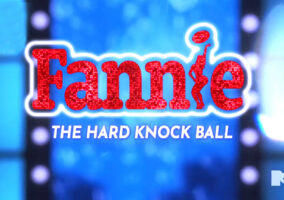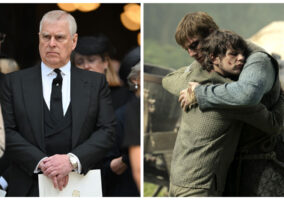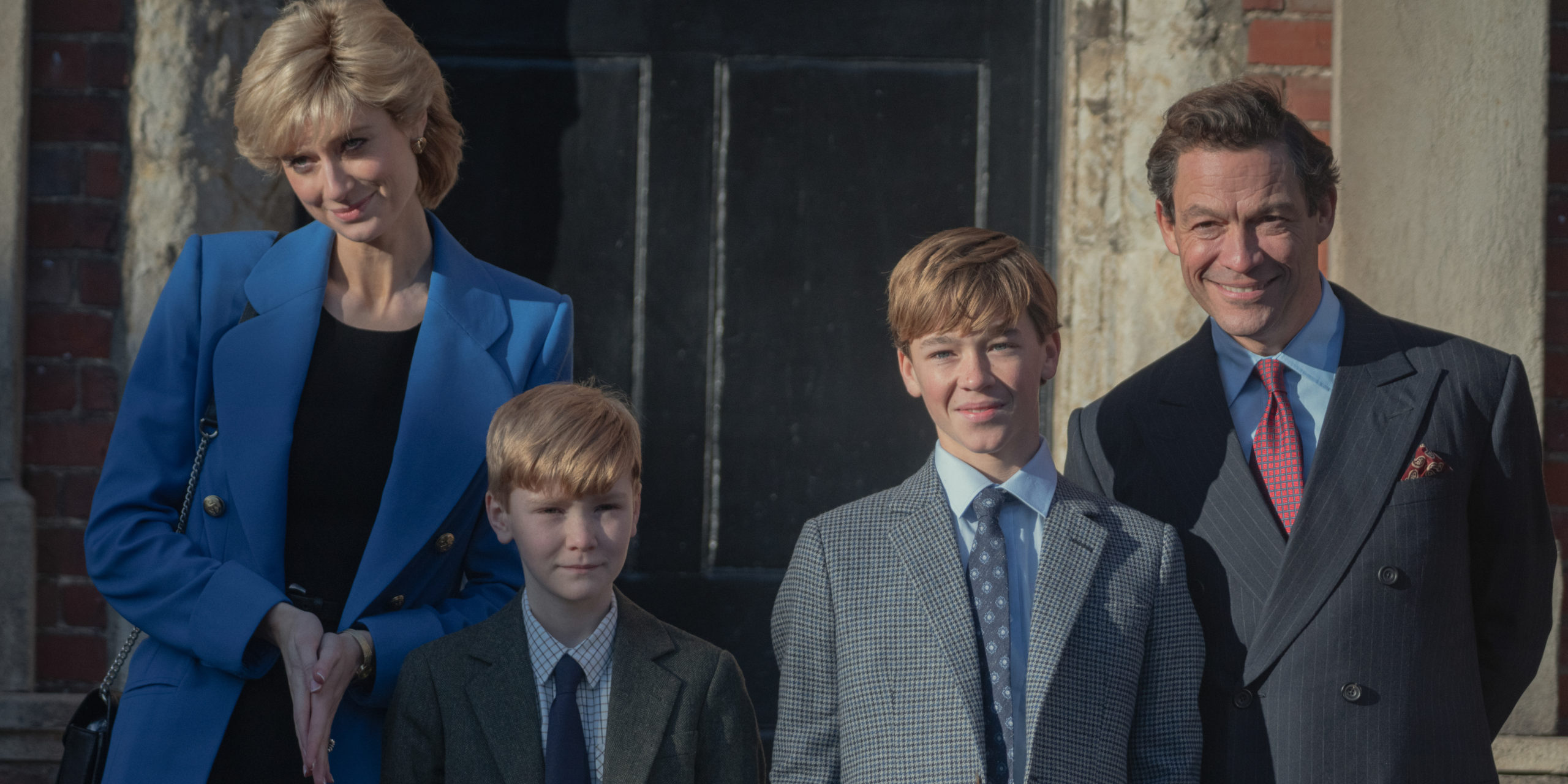
It took us a bit longer to get the recap of these two episodes done because we had to sit with them for a little bit to unpack our reactions. So much of what these two episodes covers comprise some of the most iconic imagery not only of Diana, but of literally the entire decade of the 1990s. The Panorama interview was a massive international story in a way Meghan and Harry’s Oprah interview never came close to. The frenzy surrounding Diana and the open soap opera that was her marriage was completely out of control by the mid-nineties and we think the show has done a very good job of depicting that. But we also think showrunner Peter Morgan took several definitive stances on the subject matter of these two episodes and we don’t agree with a good deal of it. If last season shocked us by how committed the show was to portraying Charles in a deeply unflattering light, this season has disappointed us by leaning just a little too hard on the “Diana was unstable” perspective, which tends to absolve Charles and the family of a lot of shitty behavior.
Episode 7: “No Woman’s Land”
Officially separated, Diana suffers under the burdens of being untethered and without support, two of the very worst qualities the emotionally needy princess could ever want in her life, calling herself a harpy of a woman, “neither married nor single; neither royal nor normal,” stuck in a no-woman’s land of a life. William is preparing to start at Eton, which is leaving her more unmoored than normal, since she routinely turns to her anxious elder son for the emotional support she can’t get anywhere else and can’t see that he’s clearly suffering under the strain. As we can see at his first day at Eton, a lot of the press and public frenzy surrounding Diana is being passed on to her son as teenage girls run after his car like there’s a pop star inside and his every move is scrutinized under the glare of camera flashes. Charles and Diana can’t even make it through a photo op without hissing at each other (in a scene which stretches credulity slightly, since the sight of Charles admonishing Diana in front of a wall of cameras would have been an international headline by this stage). The Queen is pleased to see William at Eton, close enough for him to have over for tea on a regular basis (and without his parents’ involvement or presence, it should be noted). When the invitation comes, Diana asks him to put a good word in for her, which is yet another way the show tends to depict her as being somewhat inappropriately open with her children about her problems. After all, William is never shown to be concerned about her or supportive, just upset that she keeps telling him these things. While keeping her acupuncturist company during her husband’s heart surgery, Diana meets Dr. Hasnat Khan, with whom she is immediately (and somewhat desperately) smitten. He is also desperately trying not to notice the most famous woman in the world making eyes at him.
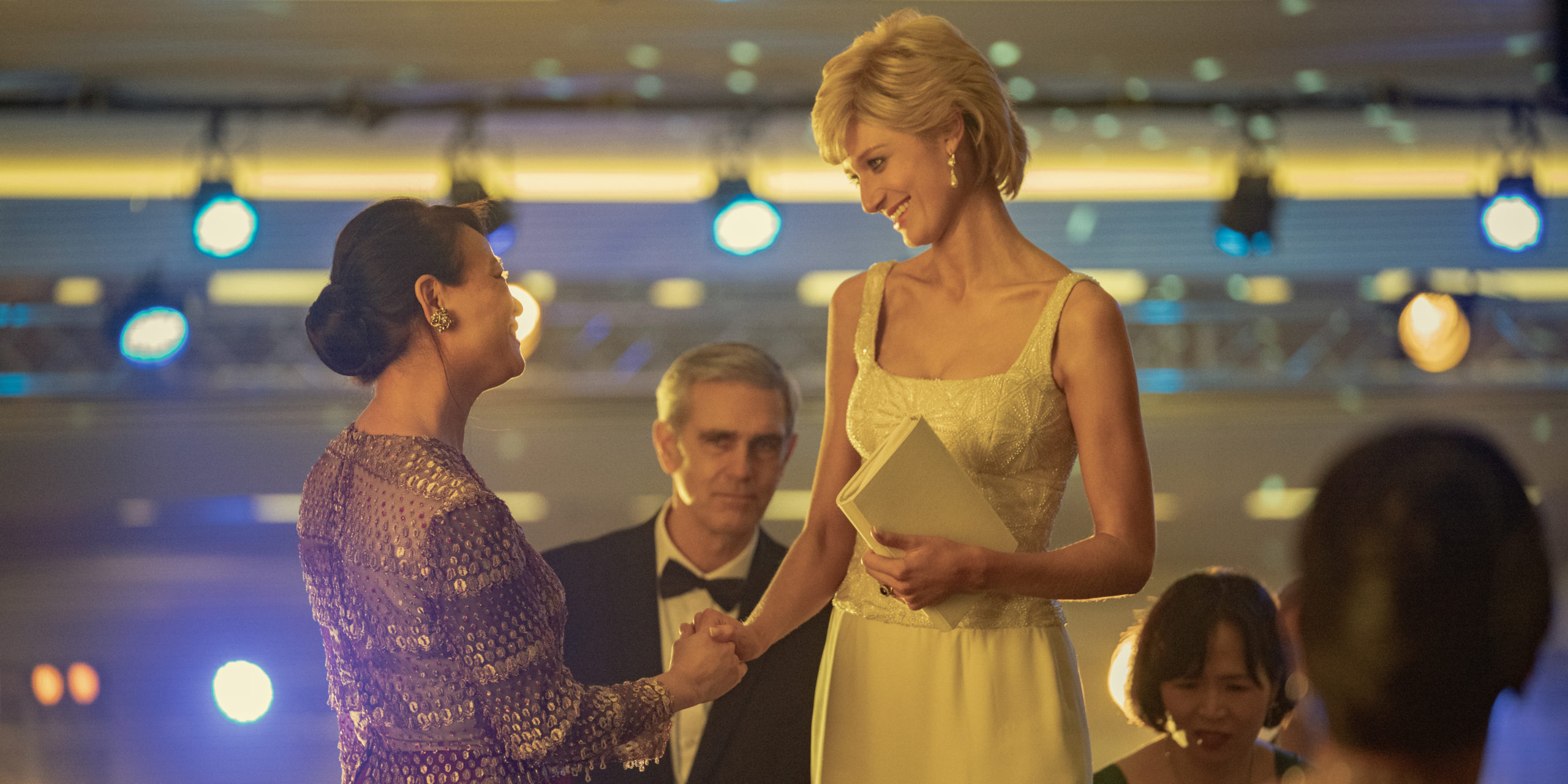
Meanwhile, ambitious BBC journalist Martin Bashir is compiling information and starting to build his case for proposing an interview. He mocks up some fake bank statements which he uses to get inside Earl Spencer’s good graces in order to get in front of his sister. He spins a tale to the Earl of various secretaries and employees leaking stories to the press at the behest of special services or GCHQ, possibly at the request of Prince Charles, which is a fairly ridiculous story for anyone to believe, in hindsight. But Bashir has done his homework or intuited a great deal from it, because Diana is increasingly convinced that her phone is being tapped and her apartment at Kensington Palace bugged. She has her whole apartment swept for listening devices but finds it hard to believe that none have been found. Her lack of familial or other support has not only left her lonely, but extremely paranoid to boot, which is pretty understandable given the predatory nature of her public life, not to mention the disaster of her private one and the amount of power held by her in-laws. The show is clearly making the point that not only was Martin Bashir an unethical journalist, but that he cruelly and maliciously played on the Princess’s own unfounded paranoia and lack of emotional support. Diana’s brother asks to see her after a 2-year estrangement (which is only mentioned in passing) and tells her everything Bashir told him about devious private secretaries working for shady companies run by MI6 (or MI5). It’s a story that hits Diana at the exact worst moment, when she’d be willing to believe almost any plot or scheme against her by “the establishment.” It doesn’t help that her brakes failed on the way to the meeting. As she said when her brother laid out Bashir’s theories to her, “They’re all in on it.”
William has tea with his gran and the two of them bond over their shared status of being picked by God to rule over the lives of men and sit above them. Also, Eton and scones. William mentions that Diana told him to put in a good word for her, which sounds like a bit of teenage acting-out. The Queen is annoyed and tells the hilarious tale about how she’s always available to talk to Diana and she’s always welcome. We would have thought this was meant to be seen as a delusional bit of cover on the Queen’s part, but she gives a monologue later that really makes it seem like the show is sticking with the idea that Diana was always the problem, not the family. She asks him if he worries about his mother and admits that he does because he wants her to be happy. “It’s not right for a child to worry about a parent,” Elizabeth replies snippily.
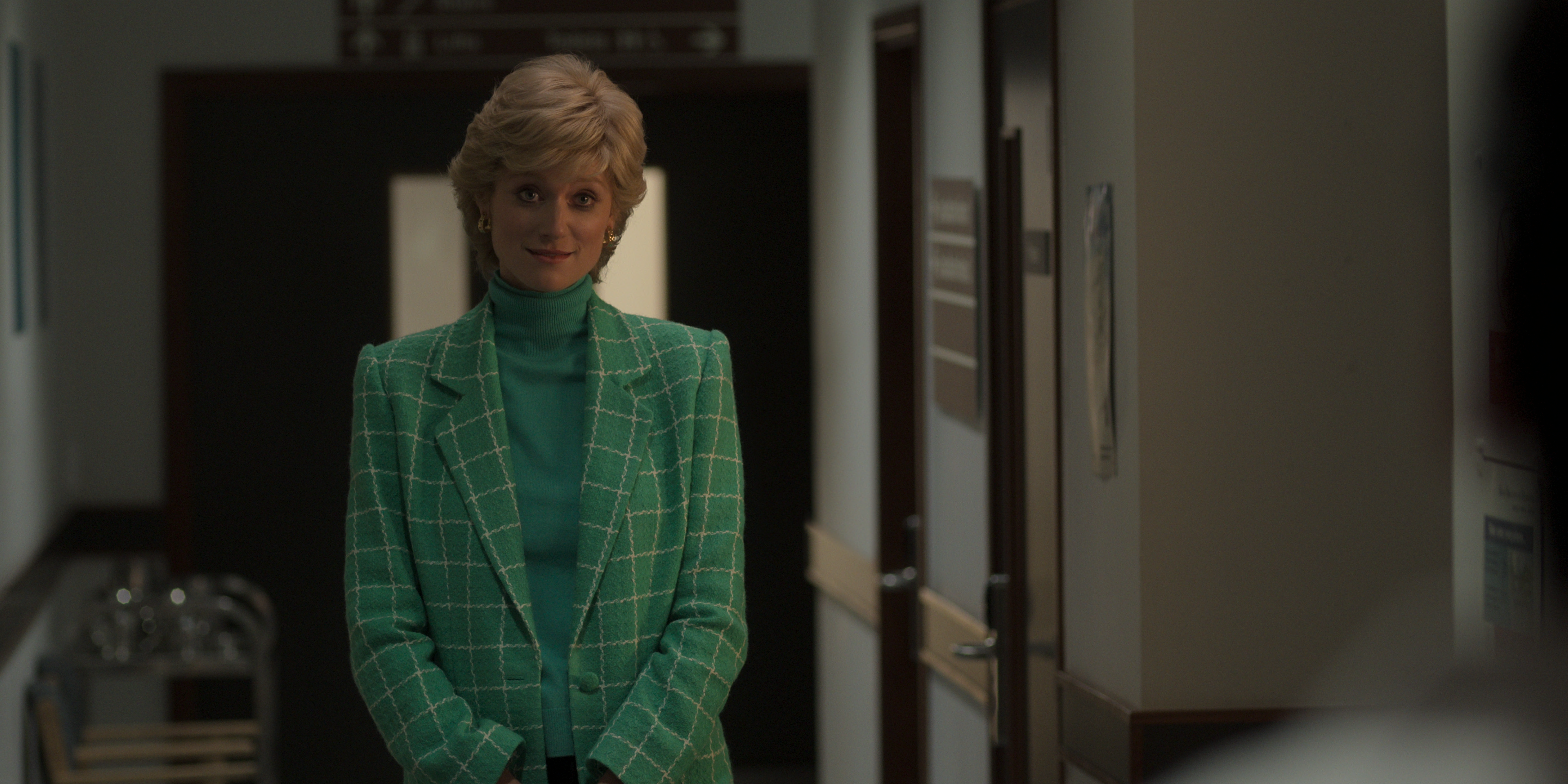
Having said that, The Crown is not unsympathetic to Diana and she’s given a wonderful montage of scenes that are both touching and sad, as she hangs around the cardiac ward for hours at a time, chatting with patients and nurses until late at night, partially because she really did have a heart that big and partially because she had nowhere to go and no one to talk to. It’s one of the few scenes in any depiction of Diana that truly gets what was lost when she died, a glamorous charmer of high status who understood struggle and pain on a deeply personal level and would go to the ends of the earth to make that connection with people because she felt no one else was doing it. Of course she’s also there because she has a crush on a shy heart surgeon and when he finally learns of her visits, he can’t help but be charmed by her. Their scene by the vending machines was sweet – and also an indication that Diana really wasn’t in the best place for a relationship, since she was still way too entrenched in the wreckage of her last one. It also showed how nearly impossible it would have been for her to have any relationship with a “civilian.” He is constantly un-nerved not only by her frankness, but by her mere presence. Humayun Saeed did a wonderful job of letting Hasnat’s occasional moments of “WTF IS EVEN HAPPENING RIGHT NOW” flicker ever so slightly across his face while trying to keep his composure. It was a neat little scene that showed why these two people would be enthralled with the other and also why it would be a fleeting thing for them. Even so, they charm each other into a date to see Apollo 13 together.
Diana meets with Martin Bashir. The script pulls a little trick where Bashir says things to Diana that she will later say during the actual Panorama interview. He says the royal family sees her as a threat because of her popularity and because of what she “knows.” Diana is thrilled to hear someone corroborate her own suspicions, and the show is clearly walking a line of depicting Bashir as a master manipulator while still maintaining that he wasn’t telling her anything she didn’t already suspect, something the real Diana later confirmed in a statement of support for Bashir. It’s clever, but we can’t help thinking that the show is leaning a bit too hard on the idea that Diana allowed herself to be foolishly coerced into a disastrous idea. The Bashir scandal is complicated because he did every bad and unethical thing the show is claiming he did here, but many people in the know (not least Andrew Morton) have come out in the years since the interview and stated that Diana would have done this interview eventually, with whatever journalist she chose, and wind up saying largely the same things in it. Without coming to the man’s defense, the show does a fairly good job of running down the ethical barriers Bashir broke repeatedly in getting the story, but it seems loath to entertain the idea that the interview had any journalistic value at all. Diana asks him rather offensively where he’s from-from and Bashir notes later that he thinks she’s intrigued by him because he’s Pakistani, which seems a bit fatuous as an observation.
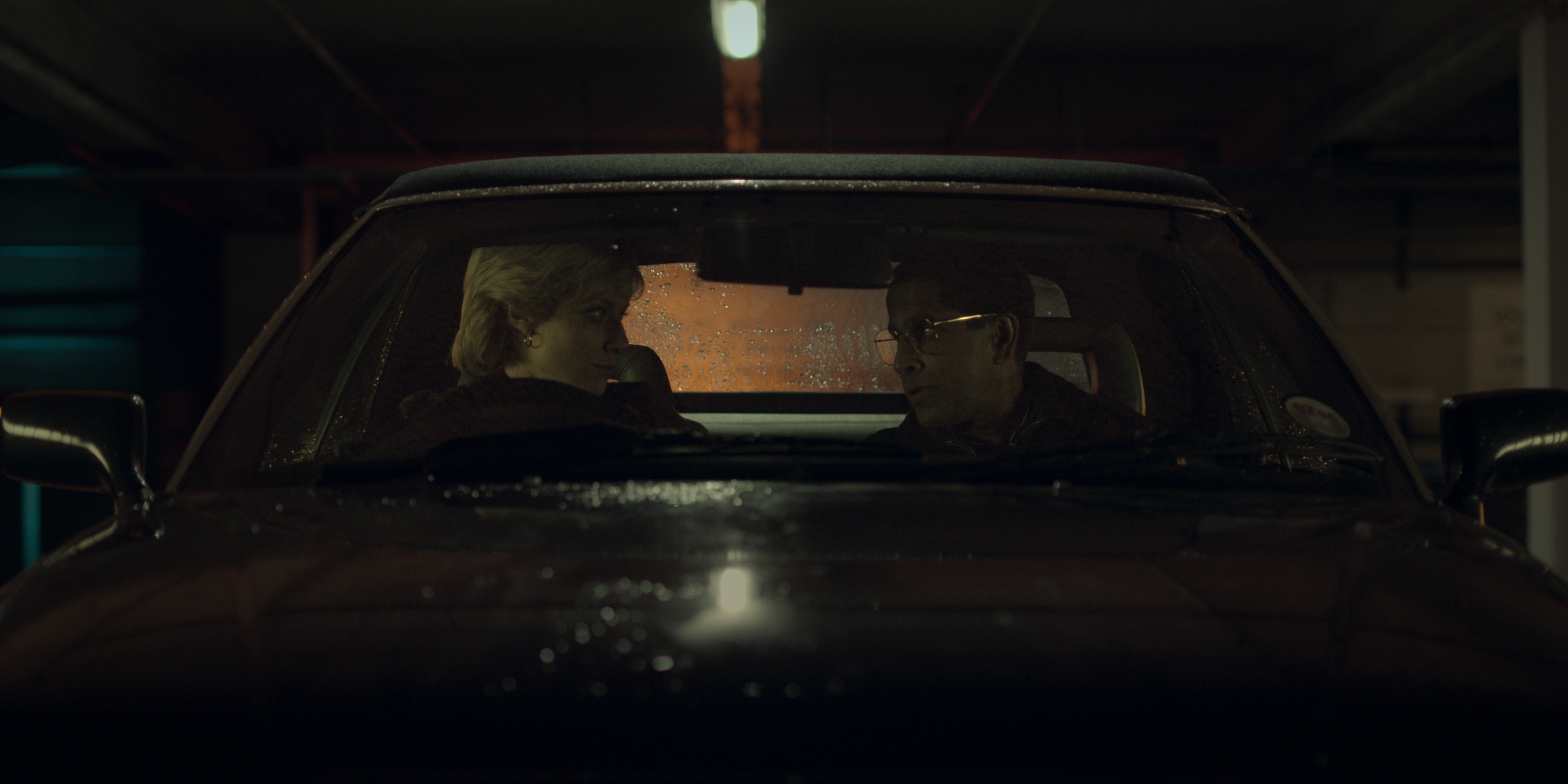
Speaking of which, Diana puts on a Russian spy wig and meets Dr. Khan at the theater for the promised Apollo 13 date. Later, she takes him back to her apartment and lets him get to first base (or whatever they call it in England) under the guise of asking how heart surgery is performed; a question she asks of him that probably indicates how inexperienced she is at dating. When he feels her heartbeat, she asks him if it’s broken and “in a great many pieces after years of neglect and cruelty,” which probably indicates just how much she shouldn’t be dating at the moment. We’d like to say the Princess had no game, but then again, she was getting felt up by a cute heart surgeon after practically no effort on her part, except for some light stalking. Hasnat suddenly realizes he just had a handful of royal breast, gets uncomfortable and tries to leave before Diana asks for “a proper kiss.” He tries to beg off, claiming she’s just too large and glamorous a person to want him. “I’m no one anymore,” she tells him, adding “You forget I already had a prince. He broke my heart. I’m just looking for a frog to make me happy.” It’s not only a cute line, it sounds exactly like something Diana (who didn’t always get the credit she deserved for her wit) would have said. They kiss and he doesn’t transform into any form of amphibian.
The Queen has lunch with Margaret in order to ask about Diana, which gives Lesley Manville the opportunity to chew the scenery ever so delicately as Margaret talks about her own star quality and how “the system isn’t easy for people like us.” Having gotten no second-hand news about her daughter-in-law except for the part about how she never feels welcome, Elizabeth then chooses to… not invite her or pursue the matter further.
Diana has an extremely dramatic meeting with Bashir in an underground car park to discuss her reluctance. He quotes an Urdu proverb to her, assuming it will win her over because of her apparent fascination with Pakistani men. It works. It feels really sleazy – on the show’s part. There are so many well-documented reasons as to why Diana did the interview. We don’t need to add an ethnic or racial fetish to the story.
Episode 8: “Gunpowder”
While the previous episode set up all of the personal reasons and machinations that led Diana to the Panorama interview, this episode is more concerned with the business and institutional side of the interview as a war erupts in the BBC over not just control, but the future of media itself. The Crown is very good at touching on all of the ways the world intersects with the royal family and there are a lot of good reasons to consider the Panorama interview the zenith of ’90s tabloid culture and 24-hour entertainment news, we tend to think a lot of this episode overstates the connection. Having said that, there is a larger conflict at work between the BBC Director General John Birt, who is trying to push the BBC into the 21st Century and Duke Hussey, the BBC’s Chairman, who is a great believer in tradition, propriety, and the monarchy. In other words, The Crown sees the Panorama interview as something that sits at the intersection of one of its main themes: tradition vs. modernity. What’s interesting about this round of debates on the topic is that the series seems to put its finger on the scale for tradition, with Hussey making some extremely on-point predictions about how the interview will be the ruin of the BBC’s reputation.
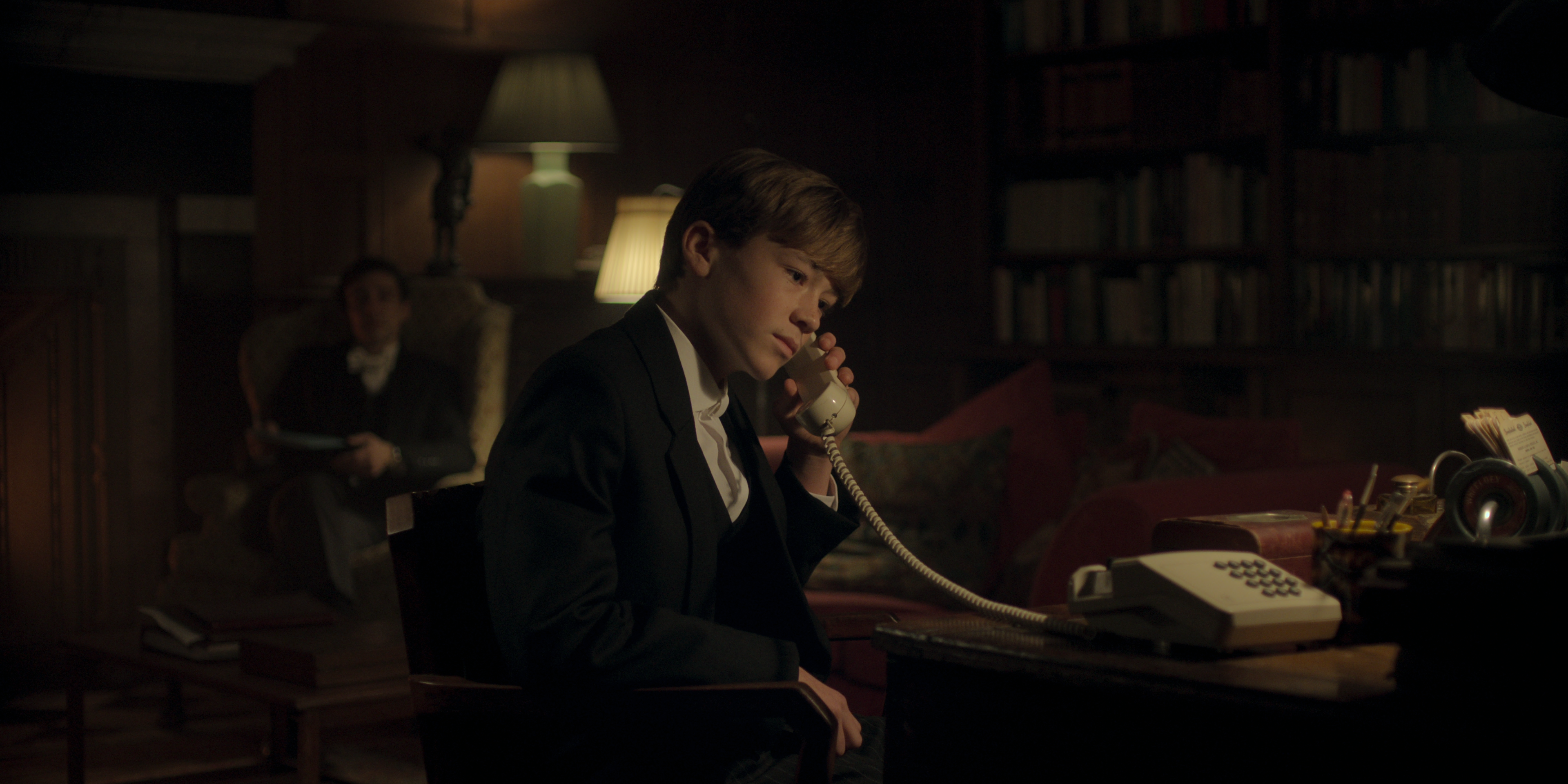
But The Crown also likes to play both sides of that issue and deal in some of the most heavy-handed metaphors you’ll find on television, which means that at the same time the BBC is having an internal conflict over the direction of broadcasting in the century to come, the Queen can’t get her telly to work right because she’s old and afraid of technology. In one of those eye-rolling scenes that tends to treat the royals like one big, close family that’s always popping in and out of each other’s homes like suburban neighbors, the Queen asks William to come over and fix her reception. William advises her to get a satellite dish, which she quite literally considers treason. We’re not sure how deliberate some of these moments are, but this is one in a string of them that makes the traditional establishment, with all of its proclamations about the ruin of the monarchy if it so much as glances at modernity, tend to look pretty silly. Of course it’s not treason for the Queen to have a satellite dish. It’s just something all of the traditionalists proclaim any time they encounter anything new.
Meanwhile, Diana and Hasnat are stealing early morning kisses as he leaves Kensington Palace, which means things are going well for now. She calls William to tell him the news, which makes him extremely uncomfortable and he lashes out at her a little, telling her that he doesn’t want to hear this sort of thing and that it’s bad enough that she’s on the news all the time. “You’re only making this harder,” he tells her, sounding way more like his father than his mother. She’s mostly shocked into silence, which is a bit of a shame, because it might have been nice to see some sort of reaction on her part to this outburst. Since it clearly didn’t stop her from going ahead with the interview, a little bit of emotional unpacking was called for here, otherwise it just comes off as the show taking another opportunity to criticize her.
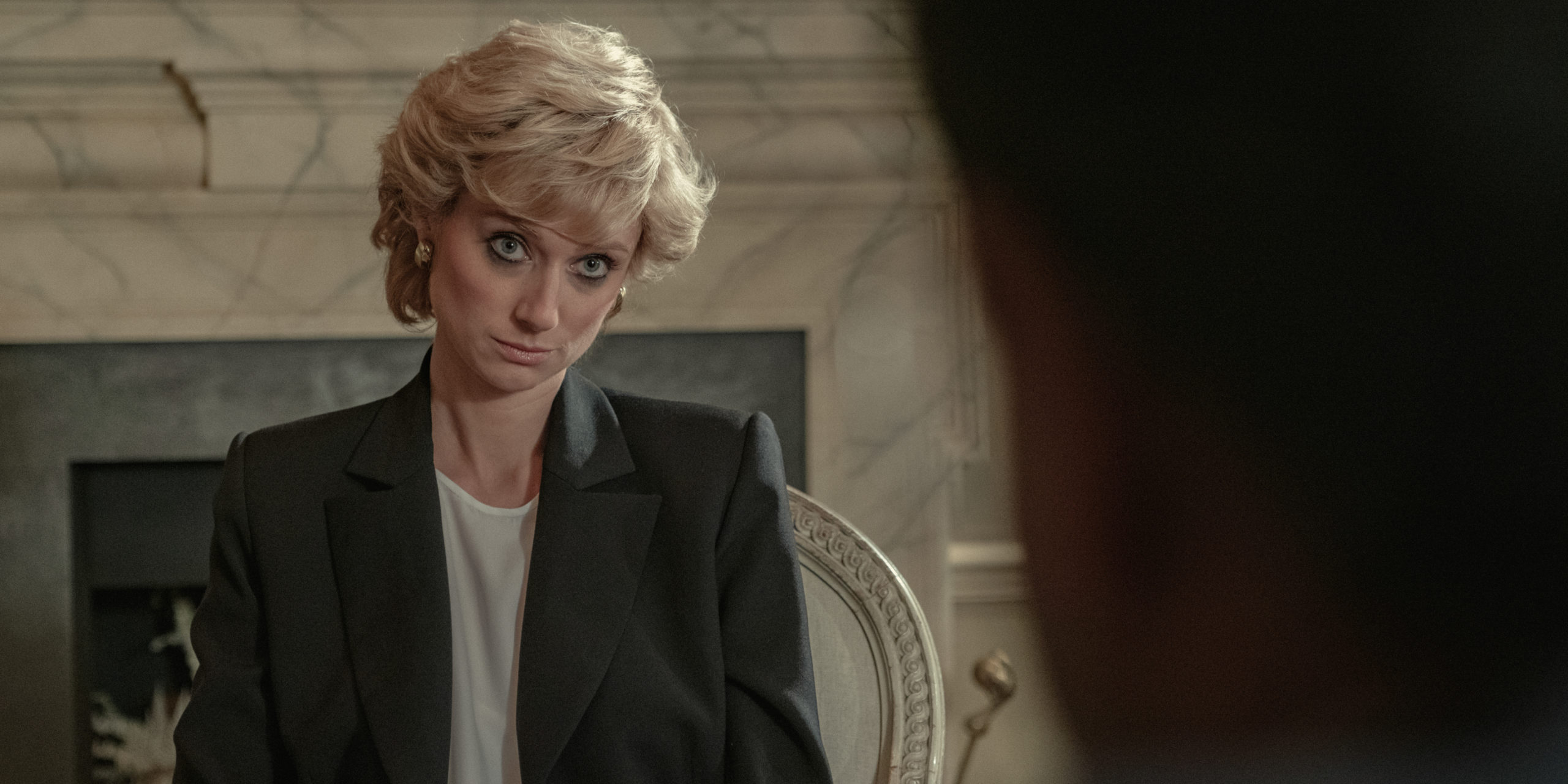
The Queen celebrates the birthday of one of her ladies in waiting, most of whom have never been seen before now on the show, which has tended to make the Queen seem far more isolated than she actually was. The point of the scene is that she won’t be able to catch the Cheltenham races on the BBC anymore and that makes her very upset, which causes Susan Hussey to go home and suggest to her husband that the BBC do something nice for her, like produce an entire program about how wonderful she is. The attempt to tie an overarching theme of “satellite television” to the whole storyline of Diana’s interview strikes us as silly and unnecessary. Speaking of un-necessary, the scene of the naked Duke removing his prosthetic leg at bedtime was jarring and strange. We have no issue with the human body being depicted, but The Crown simply doesn’t do these sorts of shots and it felt very pointed to us, bordering on ridicule. John Birt is reluctant to air the interview, but changes his mind when Duke insists that he produce a documentary on the Queen.
At Eton, William and the American viewers are painstakingly instructed on the meaning of Guy Fawkes day, in case the Metaphor Hammer wasn’t banging on that drum loudly enough. To be fair, it’s not exactly outside the realm of possibility that Diana understood the symbolism of doing the interview on that date and it’s a bit difficult not to make the connection, given how openly she attempted to do damage to the monarchy. We are treated to an extended sequence depicting the subterfuge required to get the crew and equipment inside Kensington Palace and then a further montage in which almost none of the actual interview is clearly shown. We get bits and pieces of some of the major hits, but frustratingly, the show seems more interested in over-explaining the background of the interview and the fallout from the interview without ever truly showing the viewer what was said in the interview. To be fair, most of what Diana said has already been depicted on the show and the actual interview itself has become iconic and much-quoted, but if you’re going to spend so much time trying to get inside Diana’s head and show you her paranoia, it seems a little dismissive to gloss over what that paranoia actually led her to do and say. It’s not like they didn’t have the time. After the interview, we’re treated to nearly four minutes of John Birt driving up to a hotel, walking into a hotel, talking to the desk clerk and walking down a hallway. Birt is reluctant to air such an explosive interview but ultimately decides to go for it because he’s peevish about Duke Hussey yelling at him.
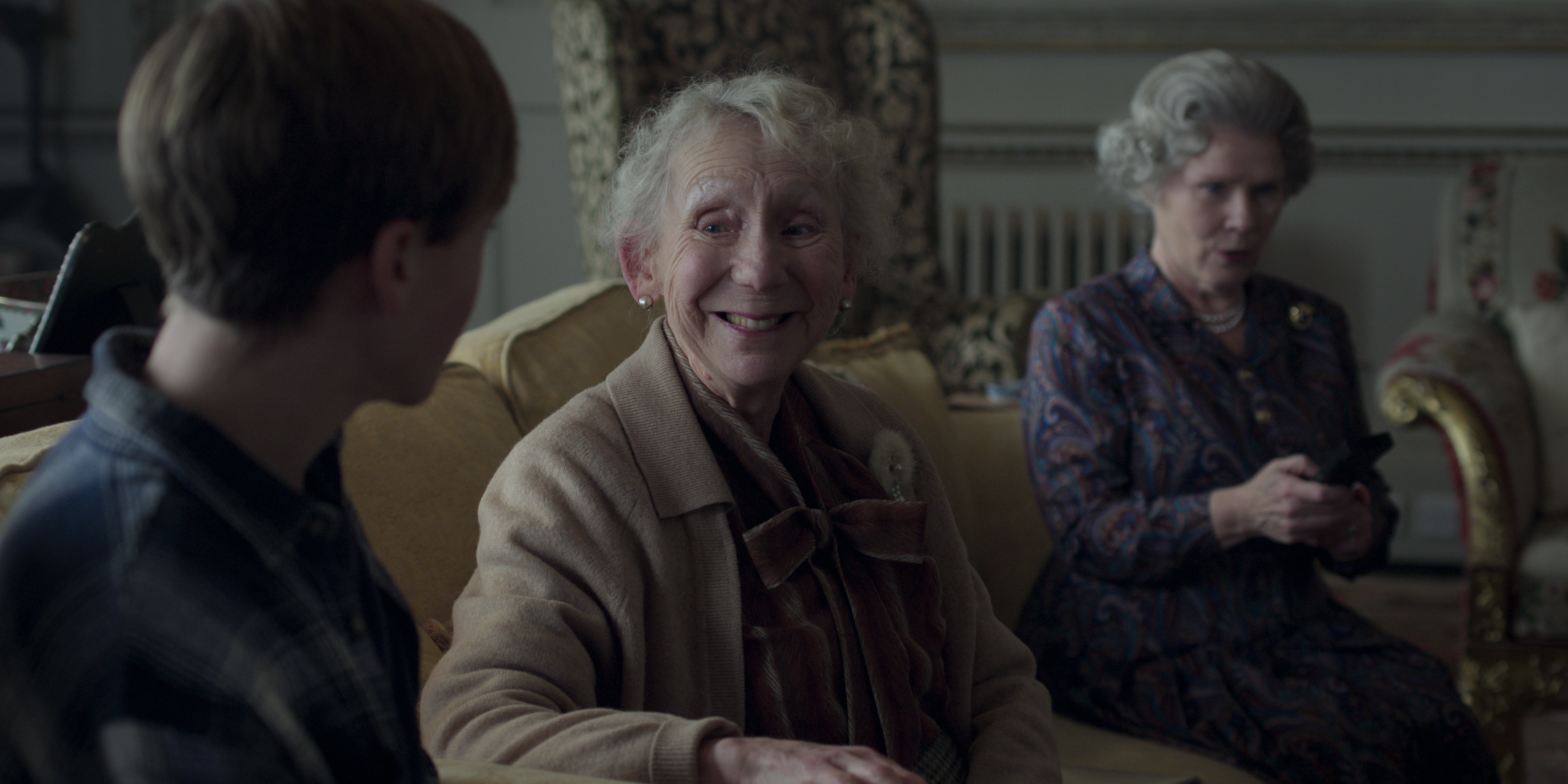
In other equally less interesting news, the Queen doesn’t know how to use a remote, which gives the Queen Mother the opportunity to quote some Wikipedia entries at William about the history of television in Great Britain in one of the clumsiest attempts yet by the show to tie mundane Windsor day-to-day life with much larger concerns and themes. Word arrives that the Princess of Wales would like to see her ASAP and Prince William all but runs out of the room. Diana arrives that night to tell the Queen about the interview, which gives her the opportunity to tear into her and voice some things that, quite frankly, sounded like rank bullshit to us. According to Elizabeth, all anyone in the family wants for her is to be happy and they all spend a tremendous amount of time trying to make that happen for her while standing by and watching her be a terrible mother to William. This is very clearly not true, but the entire scene doesn’t read like the Queen being disingenuous; it reads like a mother-in-law getting the final word on her troublesome daughter-in-law. The fact that this confrontation never actually happened makes its inclusion here a bit suspect to us, like the show once again wanting to make it clear that Diana was a big problem and that a good deal of her drama was her own fault. It’s like the Tampon phone call (not to mention the previous decade) never happened. Diana leaves chastened and tearful.
The interview airs, Charles has a complete meltdown, the ensuing scandal hits international proportions and the Queen consoles herself by watching the races on her new telly, confused about this new modern world and apparently broken-hearted because of her “unstable” (as she put it to Margaret) daughter-in-law.
Baby2Baby Gala 2022 Red Carpet Rundown Next Post:
Janelle Monáe in Elie Saab Couture at the GLASS ONION: A KNIVES OUT MYSTERY Los Angeles Premiere
Please review our Community Guidelines before posting a comment. Thank you!

